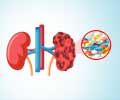Dr. M.K. Mani, Chief Nephrologist, Apollo Hospital, Chennai, India and Kidney Help Trust have a proven way to prevent chronic renal failure at a community level with a very limited budget.
(Interview with Dr. M.K. Mani, Senior Consultant Nephrologist, India)
Dr. M.K. Mani, Chief Nephrologist, Apollo Hospital, Chennai, India, and Managing Trustee of Kidney Help Trust, Chennai, India, has proved to the world that it is possible to prevent chronic renal failure at a community level with a very limited budget. True to the maxim, “The smallest good deed is better than the grandest good intention,” the rural program of the Kidney Help Trust envisioned by Dr. M.K. Mani has been instrumental in preventing around 60% of chronic renal failure in a small rural community in Sriperumbudur Taluk, about 50 kms from Chennai.Medindia Spoke to Dr.M.K.Mani and heard from him the dynamics of the Project that helps poor people keep a check on their health condition—mainly diabetes, hypertension and kidney diseases.
Q: Doctor, at the outset could you share with us the major highlights of your Kidney Help Trust—particularly the program aimed at preventing chronic kidney disease (CKD) among the rural poor?
A: • Around 60% of chronic renal failure has been prevented in a target population of 21,000 people from the lower economic strata in a rural area in India. The area adjacent has 28 patients with chronic renal failure per 1000 population, but in the area we have covered it is only 11 per 1000 of the population
• 96% of hypertensives had their blood pressure well controlled through this project
• Glycated hemoglobin (HbA1c)- was down to 7% or less (indicating near perfect control) in 52% of the diabetics and a further 25% had the level brought down by 10% of the original reading. Major American and British studies had demonstrated that a 10% reduction of glycated hemoglobin meant 40% fewer patients with vascular complications like heart attacks, strokes and renal failure.


• People were treated for diabetes and hypertension with the cheapest available drugs, which are among the most effective, though they have gone out of vogue
• Most of these people are on daily wages, and cannot afford to go to a Primary Health Centre, spend a few hours in a queue, and receive a week’s supply of medicines. They would lose a day’s wage, and will only go to the PHC if they are prevented from working by a severe pain or a high fever. They will never take treatment from the PHC for diseases that need life long treatment
• Our statistics prove we can establish good control of hypertension and reasonable control of diabetes in the community, thereby preventing vascular complications at least in some patients
• Though there are domiciliary programs in India for leprosy and tuberculosis, Kidney Help Trust’s simple method of going to the person’s home to detect and administer treatment over a period of time is the first of its kind in India for a non-communicable disease
Q: Before we go into the details of your rural campaign to promote overall better health and to prevent chronic kidney diseases in particular, please trace the connection between diabetes, hypertension and kidney diseases?
A: The kidneys play a vital role in purifying blood and regulating important body functions such as blood pressure, formation of red blood cells (RBCs) and the formation and maintenance of healthy bones, among other things.
The kidneys receive 25% of the body’s blood supply pumped by the heart. Consequently, a huge quantity of harmful substances carried by the blood reach the kidneys. Diseases that damage the blood vessels—diabetes and blood pressure mainly, affect the kidneys since they are full of blood vessels. When the kidneys fail, toxins accumulate in the blood. The patient gradually dies a painful and miserable death following a rise in blood pressure, severe anemia, weakness, brittle bones and other complications.
Q: What are the treatment options for kidney in India?
A: India has excellent nephrologists and urologists and numerous hospitals spread across the country in urban and some suburban areas with facilities to treat end stage renal disease (ESRD). On the downside, the cost of treating kidney diseases, though cheaper than in most other countries, is too high for the vast majority of Indians. It would cost close to Rs. 400,000 ($8114) for the least expensive form of treatment, transplantation, and an annual maintenance cost of close to Rs. 100,000 ($2028). How many Indians do you think can afford that sum?
Anyone who is familiar with the hard economic facts of India will clearly understand that the treatment of established end stage renal disease is a pipe dream for the average Indian.
Q: How exactly did your project for the prevention of chronic renal failure in a rural community take shape?
A: The Kidney Help Trust (registered with the Government of India and cleared to receive contributions from abroad) was started in 1985 by a group of 5 doctors and 2 philanthropists, who had renal patients in their family, aiming to raise funds to help patients to pay for transplantation. Two years later we realized that our accumulated funds would pay for only 15 transplants. It seemed unfair that only a fortunate few benefited from our exercise, while hundreds of thousands died from renal failure for want of money.
The Kidney Help Trust decided to change track and use its limited funds to benefit a larger number of people with kidney disease. We understood that where resources are minimal and problems are colossal, we need to provide the greatest good for the greatest number at the least expense. The focus was changed to prevent chronic renal disease at a very low cost by early detection and treatment of hypertension, diabetes (the major causes of kidney failure) and other kidney diseases.
Q: How did you go about translating your plan into action?
A: Diabetes and hypertension are widely prevalent in India. Our plan was simple. We would identify all diabetics and hypertensives early, by an annual survey of the entire population, and control their blood pressure and blood glucose with the cheapest methods. If diabetes and hypertension are well controlled, the blood vessels will not be affected, and we should prevent damage to the kidneys. While that was not our original aim, we have some evidence that we might have reduced the incidence of strokes and heart attacks too.
Since 70% of India’s population resides in villages, we selected 26 villages in Sriperumbudur Taluk, 50 kms away from Chennai, Tamil Nadu, South India, with a population of around 21,000. We decided against the widely followed practice of organizing camps to attract patients because, in my experience, only those who know or suspect they have a disease will go to camps. Going to a well publicized camp will take them half a day, and is just like going to the PHC. Also, these diseases need lifelong treatment, and camps cannot provide that.
Each PHC is manned by 2 doctors and a number of paramedical personnel, and covers a rural population of 25,000 over an area of around 50 sq kms. The Primary Health Centre or PHC may be 10 or 15 km from the village, and people have to trek across fields or travel in bullock carts or in buses that ply infrequently to get a week’s supply of medicines. Families subsisting on a bare minimum, visit these PHCs only if they are unable to attend work due to severe pain or high fever and look for just enough treatment to help them return to their job as early as possible. Chronic diseases are ignored—left undetected and untreated. We have to take the service to them.
Q: How do you manage the manpower needed to keep this project going successfully for the last 10 years showing extraordinarily promising results?
A: The demographics of the entire area were mapped out. We recruited girls who had finished schooling and stayed at home till they got married, and they were our Preventive and Social Health Workers (PSHW). We trained them to fill out forms and registers, to record blood pressure and to examine urine for protein sugar. The girls receive a stipend of Rs.2000/-a month.
We have a doctor who lives in the city. We take the doctor to the villages in rotation and pay him or her Rs.1000/-per visit. We have a van, and provide them transport to the project area.
The PSHWs go from door to door, using cycles provided by the Trust, and apply a questionnaire to every member in each family. The urine of every individual is collected and examined for albumin with sulpho-salicylic acid, and for reducing substances with Benedict’s reagent, and the blood pressure is recorded.
All who test positive by the questionnaire, the urine or the blood pressure are seen by our doctor who usually sets up a makeshift center on a school verandah or panchayat office or under a shady tree. If the patients do not come to the doctor, the doctor goes to the house and sees them, ensuring maximum possible compliance. All patients are treated with the cheapest yet most effective drugs—reserpine and hydrochlorothiazide, metformin and glibenclamide.



Special mention must be made of the enterprising PSHWs who devised compliance registers for patients, and made each person wash the container in which his/her urine was collected, as well as the test tube in which it was examined. The PSHWs had instant recognition and acceptance in the community because they were born and brought up there.
Q: Doctor, we are amazed by the determination and sincerity of purpose with which your Kidney Health Trust’s pro-active approach helped in checking kidney diseases and perhaps other cardiovascular diseases in a rural community. Do you think this plan can be implemented successfully by others in other places?
A: Most definitely, yes. The simplicity of our methods and the low cost involved in this project renders it applicable by small groups all over India and in other developing countries. Even in cities a philanthropic person could cover the families in his own street as a public service.
I have not found much enthusiasm among my peers and my young colleagues for this venture. But the Loyal Textile Mills at Kovilpatti, South India, MVJ Medical College, Hoskote, Bangalore and a reputed doctor in Cuddalore, South India, have started similar programs, and many others have plans to follow suit.
The Kidney Help Trust has lit the spark by demonstrating that with very little effort and expense we can achieve very good results. I am greatly indebted to Dr. Manjula Datta, formerly Professor of Epidemiology at the MGR Medical University, who has been the kingpin of the project. She attended to much of the day to day organization. Once a set of workers is trained and the project is started, it can easily be maintained by the PSHWs with just a little supervision and help. I can only hope we will be able to draw many other people and groups to take up similar work, and thereby cover the entire country.
Editorial Note - Diabetes and hypertension are on the rise in India. India is already pipped to become the diabetes capital of the world. Both these conditions are already the major cause of kidney failure in India. The prevention strategy at low cost is the only way forward to overcome the problem of kidney failure in our country.
Dr. M.K. Mani and his team with their innovative efforts undertaken at the grass root level to reach the poorest of the poor in a community have shown the way forward to prevent kidney failure among the rural poor.
Medindia further learnt that Dr. M. K. Mani who received the prestigious John H. Dirks Award from the International Society of Nephrology in 2005, earmarked the entire sum for training programs meant for representatives of Non-Governmental Organizations, (NGOs) hoping they will set up similar programs in their areas of activity.
Medindia sincerely wishes more health experts will learn from Dr. M.K. Mani’s experience and be encouraged to work for overall improvement in the Indian health sector and everywhere else in the world, affording health interventions for rich and poor alike.
Philanthropic organizations can help the ‘Kidney Help Trust’ to continue this work. For further details of the project contact:
Dr. M.K. Mani, 1, Kasturirangan Road, Chennai 600018, India. E-mail:mkmani537@bsnl.in
Source-Medindia
Thilaka Ravi/L













